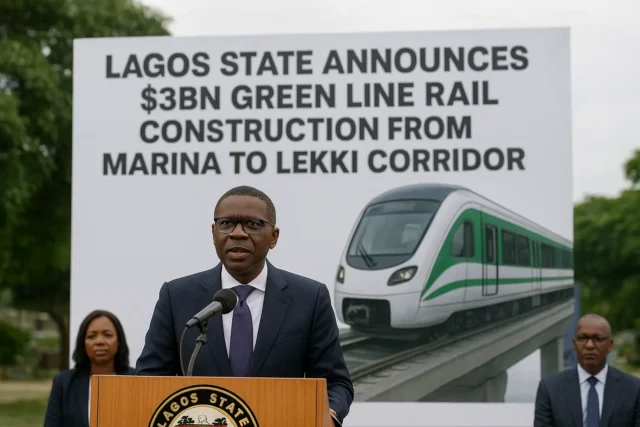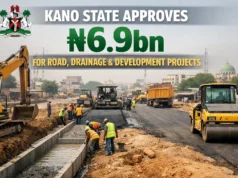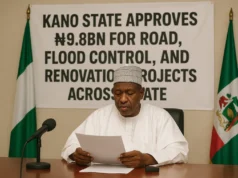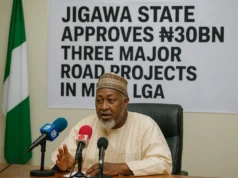The Lagos State Government said on Oct. 13 that construction on the $3 billion Green Line Rail project, linking Marina to the Lekki corridor, will start officially in December 2025.
Lagos State Commissioner for Transportation, Oluwaseun Osiyemi, confirmed this in a statement shared on the official X account of the Lagos State Government. He called the project one of the biggest transport plans in the state’s history, to be done in phases over two to three years. The first phase will go from Lekki First Tollgate to Epe, while the second phase will start from Marina and run partly on water.
Osiyemi explained that the government has finished detailed feasibility studies and met with residents, traditional rulers, and business owners along the Lekki-Epe corridor to reduce disruptions when work begins. “The government has carried out wide stakeholder engagements and feasibility studies along the Lekki-Epe Expressway corridor because the Green Line project will commence in December,” he said. “It will take about two to three years and will come in phases, beginning from Marina to Epe. The first phase runs from the Lekki First Tollgate to Epe, and the second phase, starting from Marina, will be on the water.”
This announcement comes as the state steps up enforcement along the Lekki-Epe Expressway to clear illegal structures, restore wetlands for the project’s path, relocate roadside traders, and fix drainage channels.
The 70-kilometre Green Line is meant to ease heavy traffic on the busy Lekki-Epe corridor, a fast-growing area with new estates, malls, and big investments like the Lekki Free Trade Zone, Dangote Refinery, and Lekki Deep Sea Port. The line will run from Marina on Lagos Island to the Lekki Free Trade Zone, with 17 stations on elevated and ground-level tracks through Victoria Island, Lekki, Ajah, Sangotedo, and Epe, connecting homes and businesses.
Each station will have modern features like pedestrian bridges, elevators, escalators, and ticketing systems like those on the Blue Line and Red Line. A big depot will be built near Sangotedo for train maintenance, and a 15-hectare parking lot near the Lekki Free Zone for park-and-ride users.
Trains will be eight-car sets reaching speeds of 100 kilometres per hour, with waits as short as three minutes. The line is expected to carry up to 35,000 passengers per hour each way, cutting travel time from Marina to Epe to under one hour.
The project costs about $3 billion (around ₦4.5 trillion at current rates), with the Federal Government committing ₦146.14 billion as counterpart funding in the 2025 budget. A tripartite agreement was signed with China Harbour Engineering Company (CHEC) for design, funding, building, and operation under a public-private partnership.
On April 9, 2025, the Lagos Metropolitan Area Transport Authority (LAMATA) released a video presentation on the project’s design, route, and funding. It confirmed CHEC will handle construction, while LAMATA will run it after completion.
Transport experts and planners welcome the project but worry about station spacing, especially long gaps in Victoria Island and Lekki Phase 1, which might limit access and ridership. They also question if eight-car trains will handle future demand with Lekki’s fast population growth. Experts suggest adding more stations in crowded areas and linking with other rail lines for better connections.
For many in the Lekki-Epe area, the Green Line brings hope for ending daily traffic jams, where trips from Lekki to Lagos Island can take up to four hours in peak times. But there are fears of disruptions from construction, like road changes, noise, and property moves. The government promises timely updates, compensation for affected people, and efforts to reduce impact on daily life.
Osiyemi assured Lagosians that the focus is on a reliable, efficient, and cheap transport system for a growing city. “The Green Line project is not just about transportation,” he said. “It’s about improving the quality of life, attracting investments, and creating jobs. It will open up new economic opportunities across the Lekki-Epe corridor and beyond.”
The Green Line is part of the bigger Lagos Rail Mass Transit (LRMT) network, including the running Blue Line and ongoing Red Line. The long-term goal is six major rail lines across Lagos, linking trains, BRT buses, and ferries into one system.




